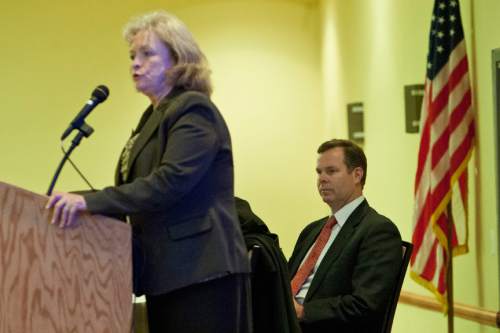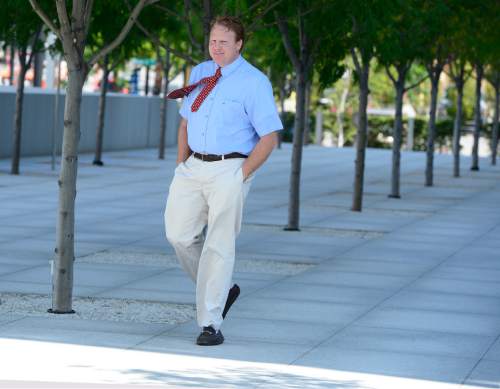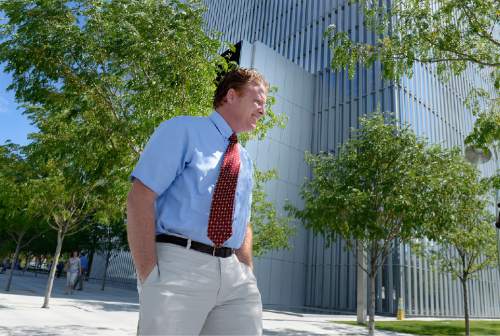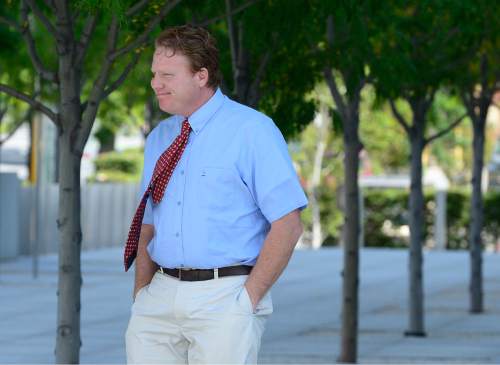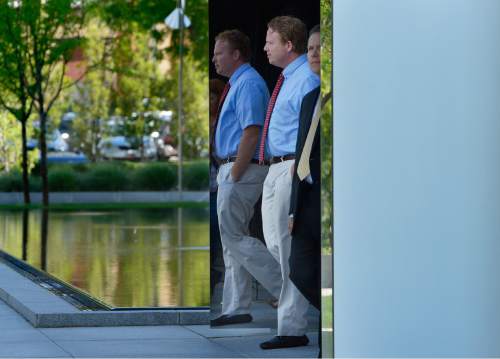This is an archived article that was published on sltrib.com in 2015, and information in the article may be outdated. It is provided only for personal research purposes and may not be reprinted.
First there were too many emails intercepted by the federal government, now there are allegedly missing emails — lots of them.
The criminal case against indicted St. George businessman Jeremy Johnson continues to get more complicated as a Feb. 1 trial inches closer — this time with allegations that several years worth of emails are missing from evidence that's been provided to the five defendants.
That comes on top of recent revelations that the government had gathered at least 4,000 supposedly confidential emails between Johnson and his attorneys and other defendants, who've all pleaded not guilty.
The latest issue came up obliquely in a hearing on Wednesday when Assistant U.S. Attorney Michael Kennedy told U.S. Magistrate Judge Paul Warner that defense attorneys had raised questions about possible evidence they believe had not been provided them as required.
Attorney Marcus Mumford, who represents former I Works executive Scott Leavitt in the criminal case, added that the dispute was over "a voluminous amount of missing data."
Neither attorney was specific. And participants in the criminal case are under a court gag order.
But in a recent document filed in a separate civil case, Johnson says that he and other defendants were not provided with complete copies of the data taken from his Internet marketing company's computers. What's missing, he says, is several years worth of emails from the time period that is critical to both the civil lawsuit and the criminal charges, which involve allegations of bank fraud.
The Federal Trade Commission's civil lawsuit, filed in 2010 in Nevada, names Johnson, his Internet marketing company I Works, various executives and others, and alleges they defrauded consumers by failing to adequately disclose additional fees that would be charged to those who ordered introductory products.
At the request of the FTC, a judge in 2011 appointed a receiver, Robb Evans & Associates, to take possession of all assets of I Works and seize equipment — including dozens of computers — to preserve evidence.
Johnson says his I Works emails from Aug. 12, 2007, to Feb. 5, 2009, have gone missing. All the emails of one former employee who's a possible witness in both the civil and criminal case, Devan Partridge, are also missing, Johnson claims, and other defendants' emails can't be found either.
The technology expert appointed by the court in the criminal case, Eric Wheeler, determined that someone had erased data or manipulated files, according to Johnson, who has been acting as his own attorney in the case since the receiver seized his assets. An affidavit by Wheeler on the issue has been sealed.
Johnson contends that "the missing email data contains crucial communications regarding I Works' compliance efforts and other evidence, which negates their liability in this case and the parallel criminal case."
Attorneys for the receiver did not return emails seeking comment. But in an earlier filing in court, attorney Gary Caris cited the receiver's technical expert while declaring "There are no withheld or destroyed or missing emails." Differences in the sizes of the databases can be attributable to differences in how they were processed by the receiver and the defense, he wrote.
Johnson wrote in the FTC case that though the defendants in the criminal case haven't received certain emails, several dozen of those same emails were provided to prosecutors who have listed them as possible evidence in a court document.
He also cites emails and time sheets that show the receiver had been conducting "overwhelming" communications with the FTC and the federal prosecutors in Utah, including informing the prosecution team of what items Wheeler had requested copies of.
Caris' previous filing said Johnson's claim that the receiver was reporting Wheeler's visits is untrue. In his reply, Johnson attached a copy of an email from the receiver's technical expert to Robb Evans & Associates about a visit by Wheeler and what he had copied or photographed.
The purpose of the email was, it said, "To keep you informed and to update Brent as requested, here is a recap of Eric Wheeler's visit."
"Brent" refers to Brent Ward, who had been the lead prosecutor when the case was first initiated, Johnson said.
The civil case is set for a bench trial Jan. 19 in Reno.
Still awaiting a hearing in Johnson's criminal case is the government's seizure of several thousand emails between Johnson and his attorneys, communications that normally are confidential, according to a legal principle known as attorney-client privilege.
In a similar situation involving a separate case, U.S. District Judge David Nuffer ruled last week that there had been no "intentional intrusion" by the government and he declined to impose any sanctions.
But in a court filing late Friday in Johnson's criminal case, attorney Ed Wall, who represents defendant Bryce Payne, asserted that the government's own court filings show they have accessed and reviewed privileged emails.
"In this case the prosecutors have seen the attorney-client communications, analyzed them and list the communications as evidence for use in their case-in-chief," Wall wrote.
He asks that either the U.S. attorney's office for Utah be disqualified from prosecuting the case or that the charges be dismissed.
A hearing involving the Johnson emails is set for Oct. 29.


